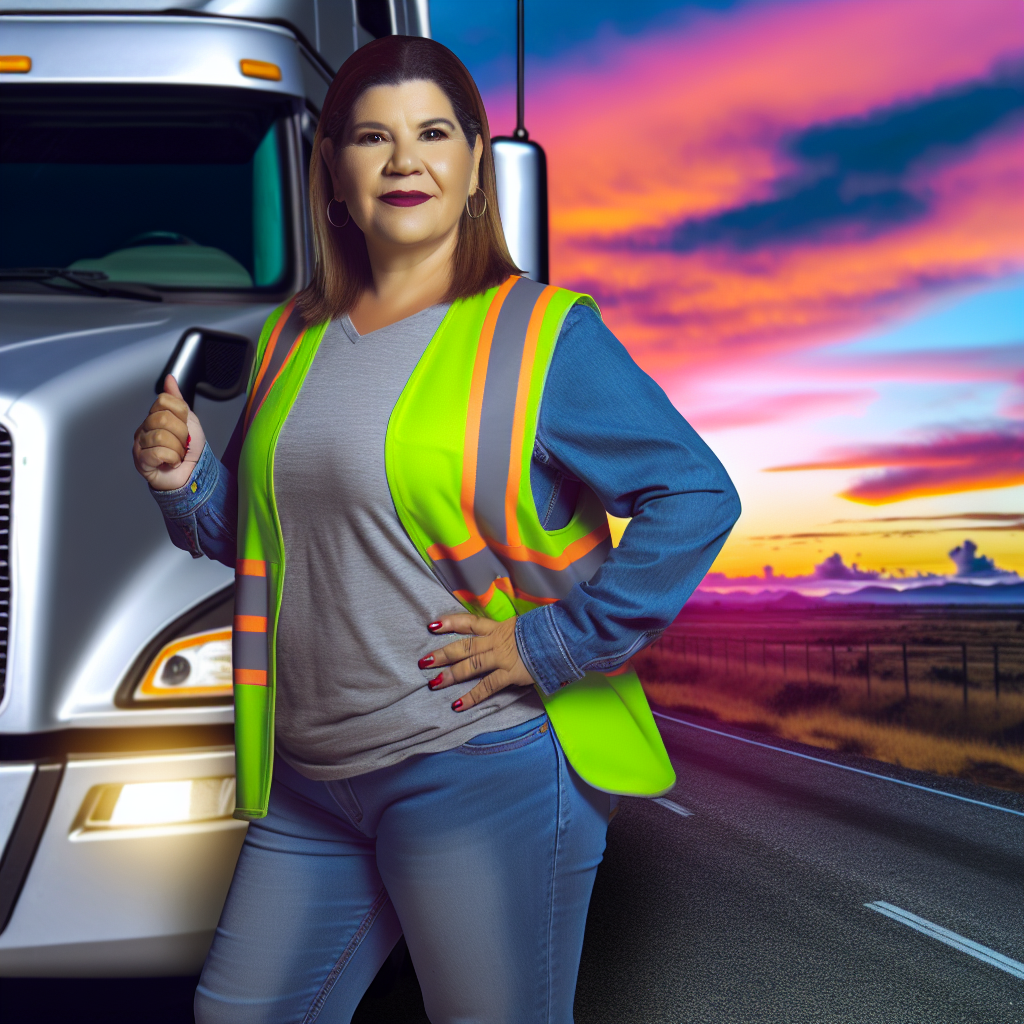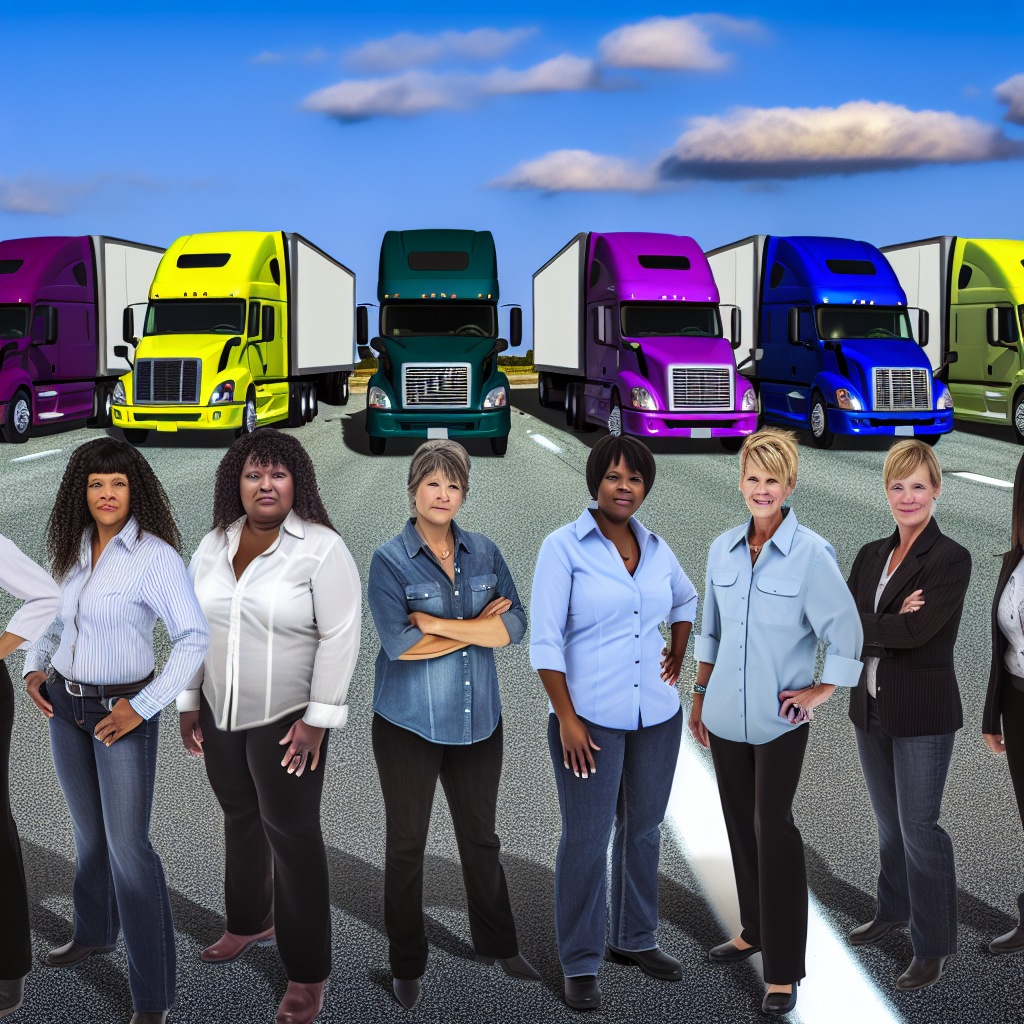In an industry that has long been characterized by its male dominance, women are stepping up as catalysts for transformative change within the trucking sector. The narrative is shifting as more women take on the roles of drivers, leaders, and advocates, heralding an era where Women in Trucking are not just participants but pioneers of a safer, more inclusive workplace culture.
Their stories, filled with resilience and determination, illuminate the critical need for representation and diversity in an environment that must prioritize safety for all. By challenging the status quo and demanding systemic change, these women are not merely paving the way for themselves, but are laying the groundwork for future generations of female professionals who will feel both empowered and secure in their roles.
In this pivotal movement, the voices of women are essential—not only for transforming the landscape of trucking but also for reshaping perceptions and company cultures nationwide, ensuring that everyone has a seat at the table.
Key Statistics on Women in the Trucking Industry
Recent statistics reveal important insights into women’s representation in the trucking industry for 2023:
- Professional Drivers: Women make up 12.1% of all professional drivers.
- Leadership Roles:
- C-Suite Executives: 31.6% are women.
- Supervisory Leadership: 36.9% are women.
- Board Members: 28.4% of board seats are held by women.
- Functional Roles:
- Human Resources/Talent Management: 74.6% are women.
- Dispatchers: 43.5% are women.
- Safety Professionals: 41.6% are women.
- Technicians: Only 7.5% are women.
These statistics illustrate the progress in women’s leadership within the industry, yet they highlight a critical underrepresentation in technical positions, indicating a need for continued efforts toward inclusive practices across all job sectors within trucking.
Statistical Summary on Women in Trucking and Implications for Change
Recent statistics reveal a mix of progress and ongoing challenges regarding women’s representation in the trucking industry. As of 2023, women make up 12.1% of professional drivers, reflecting a slight decrease from 13.7% in 2022 due to systemic barriers such as safety concerns and childcare availability. This raises questions about the effectiveness of current industry practices and the urgent need for change.
In leadership roles, women hold a more substantial presence, with 31.6% in C-suite positions and 36.9% in supervisory roles. These figures indicate significant progress in leadership representation. However, the stark contrast with technical roles, where women represent only 7.5%, highlights an immediate need for greater inclusivity in operational functions. Increasing female representation in technical positions is vital for cultivating a diverse talent pool and addressing the driver shortage of over 80,000 people that the industry is currently facing.
Moreover, companies with diverse leadership teams are 15% more likely to outperform their less diverse counterparts financially, emphasizing that diversity is not merely a statistic but a critical factor for innovation and success. Currently, fewer than 10% of freight companies have formal diversity, equity, and inclusion (DEI) programs, indicating a substantial gap in commitment to fostering inclusivity.
To truly advocate for systemic change, the industry must not only celebrate progress but also critically address these disparities and implement effective DEI strategies. By doing so, the trucking industry can pave the way for a safer, more supportive environment for women, ultimately benefiting the entire workforce.
Experiences of Women in Trucking
Women in trucking have faced a plethora of challenges. From skepticism about their capabilities to the complexities of navigating a traditionally male-dominated industry, their stories speak volumes about their resilience and determination. These women demonstrate that success in trucking is not only possible but achievable against the odds. Here are a few noteworthy experiences:
Kelly Cooper is a shining example of women overcoming barriers in trucking. After recognizing the uncertainty around women’s competence as drivers, she persevered by obtaining her A/Z license. “Don’t let the assholes win,” she often says. This highlights the fight against gender discrimination that women frequently face in this industry. Kelly emphasizes the need for an inclusive environment in trucking, where mentorship and development can empower women to pursue leadership roles.
Another remarkable story is that of Tracy Rushing, who has been a trailblazer for nearly 30 years. She started in roles typically assigned to women and gradually advanced her career through mentorship and determination. Tracy underscores the importance of finding one’s “why” in the industry, saying,
“Determining your ‘why’ is vital to your career and your mission to move America.”
Her conviction encourages not only women but everyone in the industry to seek purpose in their work.
Chanita Ward, a professional truck driver, shares her insights into the critical aspects of driving safely under pressure. Recalling advice from her trainer, she notes:
“As long as you pay attention to your surroundings, remain patient and breathe… you can make it through any situation.”
Chanita’s experience encapsulates the importance of composure in the face of challenges and demonstrates how women can excel in a high-stress environment.
Sarah, a recent graduate from a truck driver training program, shares her journey into the trucking industry, advising newcomers to believe in themselves. She encourages other women, saying:
“Don’t underestimate your competence. Just because trucking is a male-dominated field, do not think you are not as capable.”
This sentiment resonates strongly with many women entering the workforce, helping to combat self-doubt.
Lastly, Shira, another graduate from the same program, emphasizes the supportive nature of the trucking community. Sharing her positive experiences, she states:
“When you see other women on the job, it’s an immediate sisterhood because we are still the minority.”
Shira’s reflections reveal the camaraderie among women, fostering an environment of mutual support and encouragement.
These personal stories highlight the unique struggles and triumphs of women in trucking. They serve as a source of inspiration and as a testament to resilience, collective spirit, and the ongoing need for systemic change within the industry. Women like Kelly, Tracy, Chanita, Sarah, and Shira aren’t just participants in trucking; they are pioneers pushing for a future that is more inclusive and supportive.
| Program Name | Description | Results/Impacts |
|---|---|---|
| Women in Waste | A program created by GFL to empower and support women in the trucking and waste management sectors. | Increased representation of women in leadership roles and community awareness. |
| Mentorship Programs | Various initiatives that connect female drivers with experienced mentors in the industry. | Enhanced career development and retention for women drivers. |
| SheDrive initiative | A program aimed at recruiting and training women in truck driving, fostering inclusivity within the industry. | Improved women’s access to training and increased driver pool. |
| Women in Trucking Network | A community focusing on networking, professional development, and support for women in trucking. | Strengthened community ties and increased job opportunities for women. |


The Importance of Mentorship and Allyship
Mentorship and allyship play crucial roles in promoting diversity and inclusion within the trucking industry. These elements are not mere add-ons; they are fundamental to driving systemic change and fostering an environment where all employees can thrive. Through mentorship, experienced individuals can guide newcomers, offering critical insights and support that enhance job satisfaction and professional development. This support is particularly vital in an industry where women often encounter barriers and challenges unique to their gender.
Allyship, on the other hand, serves as a powerful tool for advocacy. Allies use their positions of privilege to amplify the voices of underrepresented individuals, ensuring that their perspectives are heard and valued. This collective empowerment is essential, as it cultivates a culture of belonging and demonstrates that everyone has a critical role in the process of transformation.
Organizations that embrace mentorship and allyship are better positioned to retain employees, as these frameworks create a sense of community and support within the workplace. When employees feel valued and understood, they are more likely to stay, thus reducing turnover rates and fostering loyalty. This is especially pertinent in trucking, where retaining skilled drivers is crucial amidst an ongoing industry deficit.
As Kelly Cooper aptly reminds us, “Change doesn’t happen overnight.” This statement underscores the necessity of patience and persistence in advocating for systemic shifts. Establishing effective mentorship and allyship programs requires time, effort, and commitment from all levels of the organization. However, the long-term benefits—such as enhanced employee retention and a more inclusive workplace—are worthwhile investments. By consciously cultivating these practices, the trucking industry can not only improve its internal culture but also set a standard for other sectors in the pursuit of diversity and equity.
Quotes from Industry Leaders on Systemic Change and Women’s Empowerment
To further illustrate the imperative for systemic change and women’s empowerment in the trucking industry, several notable quotes from industry leaders resonate deeply with this cause:
-
Kelly Cooper, Human Resources Business Partner at Loblaw Companies, states:
“Don’t let the assholes win.”
This powerful declaration reflects the resilience of women in trucking and the importance of fostering an environment that supports their successes rather than undermines them. -
Ellen Voie, President and CEO of the Women in Trucking Association, stresses the need for welcoming practices, saying:
“We need to make sure that they feel welcome and valued and that they can see themselves working in the trucking industry.”
This highlights the critical role of inclusivity in attracting female talent to trucking. -
Brandi J., Service Advisor at Cummins Inc., shares a compelling viewpoint:
“Some days may feel overwhelming, and in those moments, remember why you started. Every setback is a chance to grow stronger, more confident and skilled. But above all, have compassion for yourself.”
Her words encourage resilience and self-compassion among women facing industry challenges. -
Pamela Bragg, Owner and Managing Partner of Sarkany Management, emphasizes the importance of changing negative cultural aspects:
“Establishing policies against violence and bullying is essential to shifting the culture away from an old boys club.”
This statement underscores a collective responsibility to create a safer workplace. -
Kirleen Neely, CEO of Neely EAP, articulates the benefits of diversity:
“When you have a diverse workforce, you are going to have more of a plethora of information and ideas… it’s going to help you stand out.”
This perspective reinforces the value of varied voices in driving innovation and improving industry practices.
The insights shared by these leaders not only affirm the ongoing struggle for equality but also highlight the considerable progress made through collective efforts, encouraging further systemic change in the trucking industry.
Conclusion
As we reflect on the transformative journey towards equity and inclusion in the trucking industry, it is crucial to recognize that the progress made so far is just the beginning. Women continue to face significant barriers, and the push for systemic change requires sustained effort, advocacy, and compassion. The stories of resilience shared by women like Kelly Cooper, Tracy Rushing, Chanita Ward, and many others illustrate not only the challenges they face but also the remarkable strength they embody.
The importance of initiatives that support women in trucking cannot be overstated—from mentorship programs to community-building networks, each effort plays a vital role in fostering a more inclusive environment. As advocates for change, we must maintain momentum and work collectively to encourage more women to take their rightful place in this industry.
Now is the time for everyone—whether you’re a trucking professional, an ally, or a supporter—to contribute to this ongoing movement. Advocacy can take many forms: supporting local initiatives, promoting inclusivity in training programs, or simply uplifting women’s voices in conversations about the future of trucking.
Let us come together to champion these efforts, driving systemic changes that recognize, celebrate, and support women in all facets of the trucking industry. Your involvement matters. Join us in advocating for a future where everyone feels welcome, valued, and empowered to succeed. Together, we can create a trucking industry that reflects the diverse and vibrant society we live in.
Explore the evolving landscape of Women in Trucking as they drive systemic change in the trucking industry. This blog emphasizes the importance of mentorship and collective efforts for a more inclusive future. Join the movement for a safer and more diverse workplace culture.
| Category | Statistic | Description |
|---|---|---|
| Professional Drivers | 12.1% | Percentage of professional drivers who are women. |
| C-Suite Executives | 31.6% | Percentage of women in C-suite positions. |
| Supervisory Roles | 36.9% | Percentage of women in supervisory leadership roles. |
| Board Memberships | 28.4% | Percentage of board seats held by women. |
| Human Resources | 74.6% | Percentage of women in HR/talent management roles. |
| Dispatchers | 43.5% | Percentage of women serving as dispatchers. |
| Safety Professionals | 41.6% | Percentage of women as safety professionals. |
| Technicians | 7.5% | Percentage of women in technician roles. |
| Industry Driver Shortage | 80,000 | Number of qualified drivers needed in the industry. |
| Diversity in Leadership | 15% | Companies with diverse leadership teams are more likely to outperform. |
| DEI Programs | <10% | Percentage of freight companies with formal DEI programs. |
Women in Trucking: Pioneers of Change
In an industry that has long been characterized by its male dominance, women are stepping up as catalysts for transformative change within the trucking sector. The narrative is shifting as more women take on the roles of drivers, leaders, and advocates, heralding an era where Women in Trucking are not just participants but pioneers of a safer, more inclusive workplace culture. Their stories, filled with resilience and determination, illuminate the critical need for representation and diversity in an environment that must prioritize safety for all.
By challenging the status quo and demanding systemic change, these women are not merely paving the way for themselves, but are laying the groundwork for future generations of female professionals who will feel both empowered and secure in their roles. In this pivotal movement, the voices of women are essential—not only for transforming the landscape of trucking but also for reshaping perceptions and company cultures nationwide, ensuring that everyone has a seat at the table.
Key Statistics on Women in the Trucking Industry
Recent statistics reveal important insights into women’s representation in the trucking industry for 2023:
- Professional Drivers: Women make up 12.1% of all professional drivers.
- Leadership Roles:
- C-Suite Executives: 31.6% are women.
- Supervisory Leadership: 36.9% are women.
- Board Members: 28.4% of board seats are held by women.
- Functional Roles:
- Human Resources/Talent Management: 74.6% are women.
- Dispatchers: 43.5% are women.
- Safety Professionals: 41.6% are women.
- Technicians: Only 7.5% are women.
These statistics illustrate the progress in women’s leadership within the industry, yet they highlight a critical underrepresentation in technical positions, indicating a need for continued efforts toward inclusive practices across all job sectors within trucking.
Experiences of Women in Trucking
Women in trucking have faced a plethora of challenges, from skepticism about their capabilities to the complexities of navigating a traditionally male-dominated industry. Their stories speak volumes about their resilience and determination, demonstrating that success in trucking is not only possible but achievable against the odds. Here are a few noteworthy experiences:
Kelly Cooper is a shining example of women overcoming barriers in trucking. After recognizing the uncertainty around women’s competence as drivers, she persevered by obtaining her A/Z license. “Don’t let the assholes win,” she often says, highlighting the fight against gender discrimination that women frequently face in this industry. Kelly emphasizes the need for an inclusive environment in trucking, where mentorship and development can empower women to pursue leadership roles.
Another remarkable story is that of Tracy Rushing, who has been a trailblazer for nearly 30 years. Starting in roles that were often stereotypically assigned to women, she gradually advanced her career through mentorship and determination. Tracy underscores the importance of finding one’s “why” in the industry, saying,
“Determining your ‘why’ is vital to your career and your mission to move America.”
Her conviction encourages not only women but everyone in the industry to seek purpose in their work.
Chanita Ward, a professional truck driver, shares her insight into the critical aspects of driving safely under pressure. Recalling advice from her trainer, she notes:
“As long as you pay attention to your surroundings, remain patient and breathe… you can make it through any situation.”
Chanita’s experience encapsulates the importance of composure in the face of challenges and demonstrates how women can excel in a high-stress environment.
Sarah, a recent graduate from a truck driver training program, shares her journey into the trucking industry, advising newcomers to believe in themselves. She encourages other women, saying:
“Don’t underestimate your competence. Just because trucking is a male-dominated field, do not think you are not as capable.”
This sentiment resonates strongly with many women entering the workforce, helping to combat self-doubt.
Lastly, Shira, another graduate from the same program, emphasizes the supportive nature of the trucking community. Sharing her positive experiences, she states:
“When you see other women on the job, it’s an immediate sisterhood because we are still the minority.”
Shira’s reflections reveal the camaraderie among women, fostering an environment of mutual support and encouragement.
These personal stories highlight the unique struggles and triumphs of women in trucking. They serve not only as a source of inspiration but also as a testament to the power of resilience, collective spirit, and the ongoing need for systemic change in the industry. Women like Kelly, Tracy, Chanita, Sarah, and Shira are not just participants in the trucking industry; they are pioneers pushing for a future that is more inclusive, supportive, and transformative.
The Importance of Mentorship and Allyship
Mentorship and allyship play crucial roles in promoting diversity and inclusion within the trucking industry. These elements are not mere add-ons; they are fundamental to driving systemic change and fostering an environment where all employees can thrive. Through mentorship, experienced individuals can guide newcomers, offering critical insights and support that enhance job satisfaction and professional development. This support is particularly vital in an industry where women often encounter barriers and challenges unique to their gender.
Allyship, on the other hand, serves as a powerful tool for advocacy. Allies use their positions of privilege to amplify the voices of underrepresented individuals, ensuring that their perspectives are heard and valued. This collective empowerment is essential, as it cultivates a culture of belonging and demonstrates that everyone has a critical role in the process of transformation.
Organizations that embrace mentorship and allyship are better positioned to retain employees, as these frameworks create a sense of community and support within the workplace. When employees feel valued and understood, they are more likely to stay, thus reducing turnover rates and fostering loyalty. This is especially pertinent in trucking, where retaining skilled drivers is crucial amidst an ongoing industry deficit.
As Kelly Cooper aptly reminds us, “Change doesn’t happen overnight.” This statement underscores the necessity of patience and persistence in advocating for systemic shifts. Establishing effective mentorship and allyship programs requires time, effort, and commitment from all levels of the organization. However, the long-term benefits—such as enhanced employee retention and a more inclusive workplace—are worthwhile investments. By consciously cultivating these practices, the trucking industry can not only improve its internal culture but also set a standard for other sectors in the pursuit of diversity and equity.
Quotes from Industry Leaders on Systemic Change and Women’s Empowerment
To further illustrate the imperative for systemic change and women’s empowerment in the trucking industry, several notable quotes from industry leaders resonate deeply with this cause:
- Kelly Cooper, Human Resources Business Partner at Loblaw Companies, states:
“Don’t let the assholes win.”
This powerful declaration reflects the resilience of women in trucking and the importance of fostering an environment that supports their successes rather than undermines them.
- Ellen Voie, President and CEO of the Women in Trucking Association, stresses the need for welcoming practices, saying:
“We need to make sure that they feel welcome and valued and that they can see themselves working in the trucking industry.”
This highlights the critical role of inclusivity in attracting female talent to trucking.
- Brandi J., Service Advisor at Cummins Inc., shares a compelling viewpoint:
“Some days may feel overwhelming, and in those moments, remember why you started. Every setback is a chance to grow stronger, more confident and skilled. But above all, have compassion for yourself.”
Her words encourage resilience and self-compassion among women facing industry challenges.
- Pamela Bragg, Owner and Managing Partner of Sarkany Management, emphasizes the importance of changing negative cultural aspects:
“Establishing policies against violence and bullying is essential to shifting the culture away from an old boys club.”
This statement underscores a collective responsibility to create a safer workplace.
- Kirleen Neely, CEO of Neely EAP, articulates the benefits of diversity:
“When you have a diverse workforce, you are going to have more of a plethora of information and ideas… it’s going to help you stand out.”
This perspective reinforces the value of varied voices in driving innovation and improving industry practices.
The insights shared by these leaders not only affirm the ongoing struggle for equality but also highlight the considerable progress made through collective efforts, encouraging further systemic change in the trucking industry.
Conclusion
As we reflect on the transformative journey towards equity and inclusion in the trucking industry, it is crucial to recognize that the progress made so far is just the beginning. Women continue to face significant barriers, and the push for systemic change requires sustained effort, advocacy, and compassion. The stories of resilience shared by women like Kelly Cooper, Tracy Rushing, Chanita Ward, and many others illustrate not only the challenges they face but also the remarkable strength they embody.
The importance of initiatives that support women in trucking cannot be overstated—from mentorship programs to community-building networks, each effort plays a vital role in fostering a more inclusive environment. As advocates for change, we must maintain momentum and work collectively to encourage more women to take their rightful place in this industry.
Now is the time for everyone—whether you’re a trucking professional, an ally, or a supporter—to contribute to this ongoing movement. Advocacy can take many forms: supporting local initiatives, promoting inclusivity in training programs, or simply uplifting women’s voices in conversations about the future of trucking.
Let us come together to champion these efforts, driving systemic changes that recognize, celebrate, and support women in all facets of the trucking industry. Your involvement matters. Join us in advocating for a future where everyone feels welcome, valued, and empowered to succeed. Together, we can create a trucking industry that reflects the diverse and vibrant society we live in.
As we reflect on the inspiring stories shared by women in trucking, it becomes evident that their individual experiences are not isolated occurrences but rather part of a larger movement advocating for change within the industry. Their journeys highlight both the challenges faced and the resilience shown by these pioneering women. This resilience underscores the importance of establishing industry-wide initiatives that not only acknowledge their struggles but also actively work towards reducing barriers and creating an inclusive environment.
Such initiatives are essential for cultivating a culture that supports the growth and participation of women in all facets of the trucking industry.


